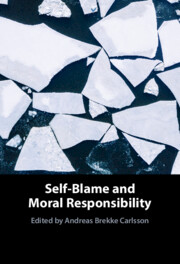Book contents
- Self-Blame and Moral Responsibility
- Self-Blame and Moral Responsibility
- Copyright page
- Contents
- Contributors
- Acknowledgments
- Introduction
- Part I The Nature of Self-Blame
- Part II The Ethics of Self-Blame
- Chapter 5 How Much to Blame?
- Chapter 6 Don’t Suffer in Silence
- Chapter 7 How Should We Feel about Recalcitrant Emotions?
- Part III Self-Blame and Moral Responsibility
- References
- Index
Chapter 5 - How Much to Blame?
An Asymmetry between the Norms of Self-Blame and Other-Blame1
from Part II - The Ethics of Self-Blame
Published online by Cambridge University Press: 05 May 2022
- Self-Blame and Moral Responsibility
- Self-Blame and Moral Responsibility
- Copyright page
- Contents
- Contributors
- Acknowledgments
- Introduction
- Part I The Nature of Self-Blame
- Part II The Ethics of Self-Blame
- Chapter 5 How Much to Blame?
- Chapter 6 Don’t Suffer in Silence
- Chapter 7 How Should We Feel about Recalcitrant Emotions?
- Part III Self-Blame and Moral Responsibility
- References
- Index
Summary
In this chapter, I begin with the observation that there is an asymmetry in our normative expectations of degrees of self-blame and degrees of other-blame. There are many situations in which it seems intuitively plausible that a person should blame herself to a certain degree, while at the same time it is also appropriate for others to blame her to a lesser degree. This calls out for explanation. In this chapter, I canvass the prospects for rejecting the idea that there is any systematic explanation to be found, as well as those of a variety of possible explanations that purport to justify a genuine asymmetry between the norms of self-blame and other-blame. These latter include explanations according to which it is virtue to over-blame in one’s own case, and in which it is a virtue to be disposed to under-blame in the case of others. In the end, I argue instead that a central and systematic explanation relies in part on a general moral principle that asymmetric risk imposition between self and others is justified. I conclude by exploring the implications of this view for whether we should privilege intuitions about self-blame, other-blame, or neither when engaged in philosophical theorizing.
- Type
- Chapter
- Information
- Self-Blame and Moral Responsibility , pp. 97 - 116Publisher: Cambridge University PressPrint publication year: 2022
- 6
- Cited by

